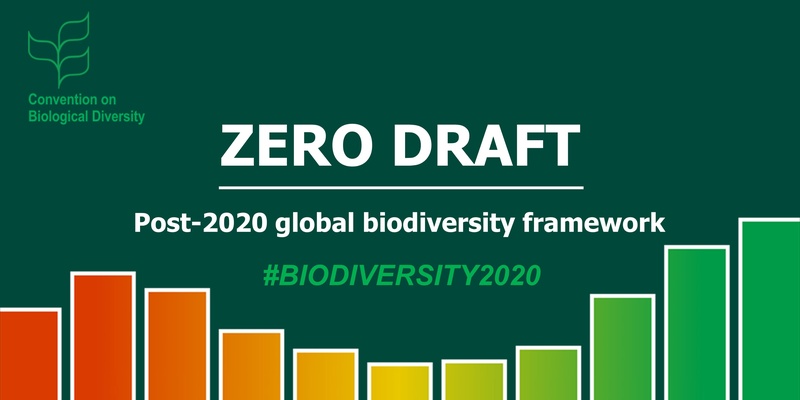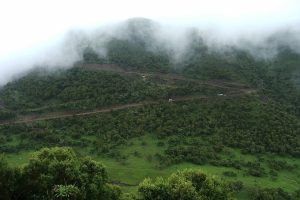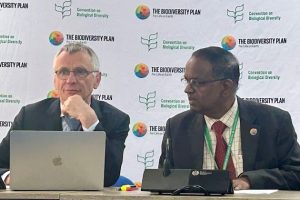
BY DARGIE KAHSAY
The United Nations Convention on Biological Diversity (CBD) has enacted a new draft on biodiversity, The Post-2020 Global Biodiversity Framework which is expected to be adopted during the 15th Conference of Parties on biodiversity (COP 15) in China. The aim of the framework is to halt the loss of biodiversity by 2030 and achieve biodiversity recovery and restoration by 2050.
The Convention on Biological Diversity (CBD) disclosed that reversing nature loss remains the top priority of the global community and investing on nature-based solution is key to achieve the goal. The post-2020 global biodiversity framework vision is “to see a world of living in harmony with nature” and promotes nature-based solutions and collective efforts of governments and individual actors to protect nature.
According to the framework, “by 2050, biodiversity is valued, conserved, restored, and wisely used and maintaining ecosystem services and sustaining a healthy planet delivering essential benefits for all people.” To achieve the 2050 goal, the framework puts a 2030 mission of “taking urgent action across society to conserve and sustainably use biodiversity and ensure the fair and equitable sharing of benefits from the use of genetic resources, to put biodiversity on a path to recovery for the benefit of planet and people,” according to the CBD website.
The 2030 vision of the framework has 21 action-oriented targets for urgent action over the decade. Each target needs to be initiated immediately to be achieved as per the scheduled period.
Enhancing integrity of all ecosystems, valuing, maintaining or enhancing nature’s contributions to people conservation and sustainable use, Fair and equitable sharing of the benefits from the utilization of genetic resources and closing the gap between available financial and other means of implementation are four basic long-term goals of the framework to be achieved by 2030 vision, CBD disclosed.
According to the UN agency, in October 2021, Parties to the UN Convention on Biological Diversity will meet in Kunming, China (COP15) to determine the post-2020 global biodiversity framework. CBD Executive Director noted that the Post-2020 Biodiversity Framework is adopted in the coming COP session in China. As an input for the coming COP-15 session on biodiversity, the open-ended working group is preparing virtual meetings from 23 August up to 03 September to advance progress on the development of the post-2020 global biodiversity framework, it added.
As part of these meetings, on Monday 30 August, the Government of Colombia has prepared a high-level political segment webinar to discuss the issue under the leadership of President Iván Duque Márquez. During the opening session of the event, the president stated that over one million species are on the path of extinction and the world is facing serious challenges of climate change and biodiversity loss.
The president underlined that climate action and protection of biodiversity is a necessity which needs the collective effort of the global community with high responsibility. Defining a road-map is important to achieve the post-2020 global biodiversity framework, President Márquez noted.
Propose zero deforestation by 2030, avoid forest fire, combating environmental crimes and protection of marine biosphere are the most important elements to be addressed, he stated. “Our protected areas must be extended to 30 percent by 2030” the President noted adding “management of plastics for the protection of oceans is also key action to protect biodiversity”
According to him, to achieve these proposals and plans, investing on nature based solutions is a fundamental action and boosting financial sources is important to preserve biodiversity. In addition, implementing payment mechanism for protected areas is also crucial to promote investments in biodiversity protection, he stated.
The president underlined that the international framework on biodiversity, which is proposed to be adopted in the coming COP session will play a decisive role in this regard to solve the major problems and to mobilize the world community, both private and government actors to give due emphasise to preserve biodiversity.
Executive Secretary of Convention on Biological Diversity (CBD), Elizabeth Moruma Mrema, on her part during the webinar stated that biodiversity remains the top challenge that the world is facing. She added that putting biodiversity on a path to recovery is the defining challenge of the time. According to her, biodiversity must be valued in decision making at all levels.
For Elizabeth, “our wealth, health, development and resilience depends on biodiversity” adding “our economies depend considerably on the flow of ecosystems of goods and services.” Hence, wise management of the ecosystem is investing on the future livelihood of the humankind. She underlined that actors in the business sector can play changing businesses from nature negative to nature positive.
According to the Executive Director to reach the 2030 vision of living in harmony with nature, “we need transformational change both at global and domestic levels.” The ambitious draft of the post-2020 biodiversity framework “will support us to live harmoniously with nature,” she stated adding “supporting for the successful implementation of the framework needs collective action and mobilization of resources.”
The UN Secretary General, António Guterres during the event on his part underlines that “biodiversity is collapsing and we are the losers,” adding “unless we take decisive timely action variety of species are reducing in an unanticipated period.” As to him, “ecosystems are suffering, oceans are overfished chocked with plastic wastage and acidifying.”
Guterres further noted that every year, the world is destroying 10 million hectares of forests, worsening the degradation of land and destruction of ecosystems. “When we degrade and destroy ecosystems around the world, we are forcing global heating more than 1.5 degrees Celsius.” The evidence is overwhelming and humanity is destructing nature, he argued.
Hence, the Secretary General calls that protecting nature must become priority for everyone, everywhere. The new draft on biodiversity, the Post-2020 global biodiversity framework is a new initiative to protect nature and indicates solutions for harmonious living with nature, he added. “Now, we know the problems and we have the solutions at hand…what remains is collective timely action. There must be practical actions at international, national and local levels,” Guterres stated.
As to him, the roadmap on biodiversity, the Post-2020 biodiversity framework, is expected to be agreed and become officially declared during the biodiversity conference in China. The plans must be fully respected to protect the values of biodiversity including their values for the economies.
New plans are needed to be acted to support agriculture and fishery as they are overexploiting and destroying natural world, Guterres reiterated. It is important to safeguard and empower the indigenous people and local communities to empower nature.
“Science gives us knowledge and tools of nature, we should strengthen diplomacy to use them properly,” he stated adding above all “we need commitment, action and credibility to live harmoniously with nature.” In this regard, the Post-2020 biodiversity framework may inspire actions across the world, Guterres stated with hope. The framework is also expected to mobilize everyone, governments, businesses and citizens to fulfill their responsibilities in this regard.
For the successful implementation of the framework, the UN head stressed that, ambitious actions are needed across the entire world on the targets of the framework and on the means of implementation. “The future of humanity depends on our collective efforts and only action can end biodiversity crises,” he underlined.
Professor Klaus Schwab, President of the World Economic Forum (WEF) also stated that failure in climate action, biodiversity loss and infectious diseases are top priority agendas of this time for the world. Hence, finding solutions for these serious challenges is a responsibility of the global community.
The Post-2020 global biodiversity framework is a new initiative in this regard to tackle among the top problems of the world, he added. Timely action and implementation of the new initiative is necessary and all actors, especially the business community should fully engage for the proper implementation of the framework, Professor Schwab noted.
“Refreshing economic models, invest in nature and nature based solutions and generate enough financial support to fill the financial gaps for the biodiversity investments are my key comments to governments and business communities for the protection of biodiversity,” WEF President underlined.
The Ethiopian Herald September 1/2021





